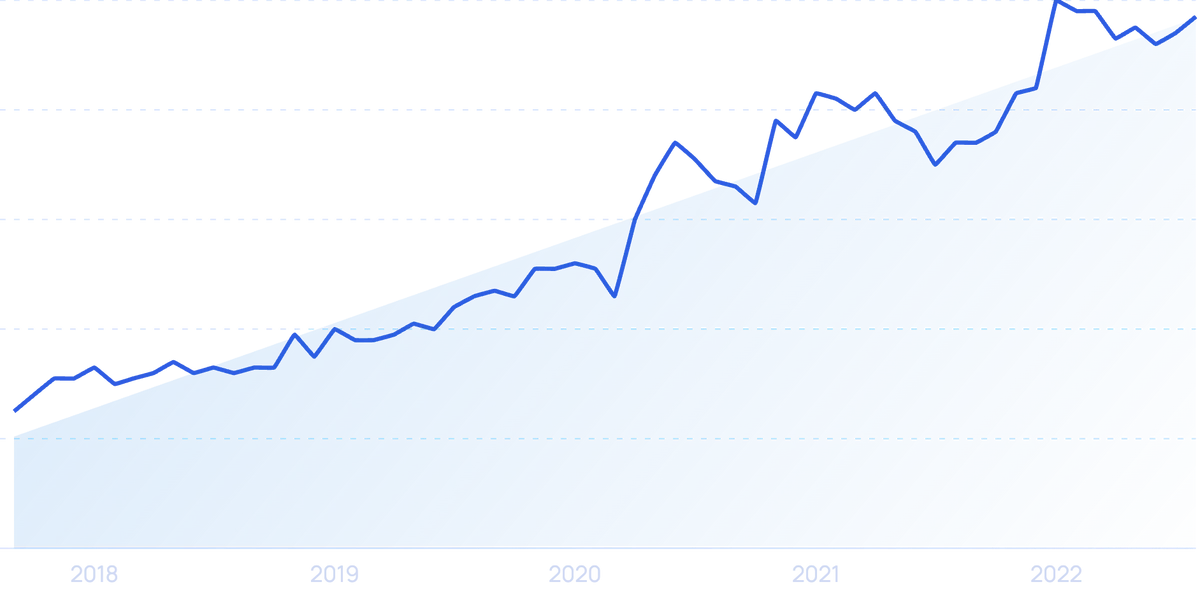Travel Journals
81 Online Review Statistics (New 2024 Data)

Whether consumers are looking for something as mundane as a new pair of shoes or something life-changing as the perfect place to honeymoon, they are increasingly turning to online review sites to help guide them in the right direction.
Google is by far the largest portal for reviews. The search giant is home to six times as many reviews as its three nearest competitors combined. And the number of people reading Google’s reviews continues to grow.
In this report, you’ll see data on the most popular review platforms, and also learn how people and businesses are responding to fake reviews and negative reviews.
Contents
Top Highlights
Here are top stats from the online review space:
- 93% of users say online reviews had an impact on their buying decisions.
- Nearly half of all internet users post online reviews every month.
- 81% of consumers use Google to evaluate local businesses.
- Yelp receives 26,830 new reviews per minute.
- The Federal Trade Commission (FTC) cited more than 700 businesses for deceptive endorsements in 2021.
- In 2020, Google removed 55 million reviews.
- Tripadvisor passed one billion reviews in 2022.
- Sustainability is a top theme in Expedia online reviews.
- The average online hotel review on TripAdvisor is 688 characters.
- 75% of businesses don’t respond to negative reviews.
General Online Review Statistics
Almost every internet user now views online reviews, with many saying reviews have a significant impact on their buying decisions. See how users are responding to what they read on online review platforms below.
Around 9 in 10 users have made buying decisions based upon an online review (Podium)
Nearly everyone (93%) says that an online review has impacted their purchase habits. Consumers expect high standards from the brands they do business with, with most saying they won’t engage with a business or product that has less than a 3.3-star rating.
Only 2% of consumers have never read an online review (BrightLocal)
Nearly every consumer now reads online reviews. 98% say they read online reviews at least “occasionally” while 77% say they read them “frequently” or “always.” The number of people who “never” read online reviews has decreased significantly, falling from 13% in 2020 to 2% in 2021.
Consumers are 1.5x more likely to be motivated by an online review than by a discount offer (Bizrate Insights)
Shoppers are more likely to be motivated by online reviews than by coupons or discount offers. In fact, online reviews (32%) are the most important factor in driving a purchase although consumers are also motivated by free shipping (24.5%), coupons or discounts (22.1%), and loyalty or rewards programs (6.5%).
Nearly half of all internet users post online reviews every month (GWI)
While younger consumers are more likely to post online reviews, nearly half of all consumers around the world post at least one online review a month. Consumers in the 25-34 age group are the most likely to post, with 53% of that age group having posted an online review within the past 30 days.
At least half of online shoppers say they trust third-party review sites more than reviews on retailer sites (Bizrate Insights)
16.6% of shoppers wholeheartedly trust third-party review sites – like Yelp – for product reviews, while 41.7% of shoppers somewhat trust third-party sites more. 7.9% of consumers need to believe a reviewer “actually uses and likes the product” before they place their trust in that online review.
Top Online Review Platforms
While there are plenty of online review sites to be found, four sites house nearly 9 in 10 of all online reviews. New reviews are being posted more frequently than before as more consumers look to these user-generated reviews to inform their purchase decisions. Learn more about which online review platforms consumers turn to the most.
About 9 in 10 of all online reviews are contained on just four sites (reviewtrackers)
Collectively, Google, Yelp, Facebook, and TripAdvisor are home to a staggering 88% of all online reviews. Google is the clear winner, housing 73% of all online reviews or more than six times as many as its closest competitors combined. The other top sites each house a fraction of Google’s content: Yelp (6%), Facebook (3%), and TripAdvisor (3%).
81% of consumers use Google to evaluate local businesses (BrightLocal)
Not only does Google have the most reviews, but it also attracts the most readers of all review sites. In 2021, 81% of consumers said they read Google reviews which is a significant increase over 2020 when just 63% of consumers read the site’s reviews.
More than half of consumers use Yelp reviews (BrightLocal)
Among the four most popular review sites, Yelp saw the largest year-over-year growth. 53% of consumers reported using Yelp in 2021 – a 21-point increase over the 32% of consumers who used the site in 2020. The increase might be related to the fact that users are also “less suspicious” of fake reviews on that site than they are on Google or Amazon.
Fewer consumers are reading Facebook online reviews than a year ago (BrightLocal)
Facebook is the only major review site seeing a decline in people reading reviews. In 2020, 54% of consumers used Facebook for online reviews. By 2021, that number had dropped to 48% of consumers. The drop might be related to Facebook’s declining trust factor, as 93% of consumers said they are “a little suspicious” of fake reviews on Facebook.
On average, Yelp receives 26,830 new reviews every minute (Invespro)
The world’s second-most prolific review site reported having 220 million reviews at the end of 2020. Today, nearly 27,000 new reviews are posted to the site every minute.
Fake Online Reviews
Fake reviews are a growing problem on all online review platforms, but especially among the top three. Most consumers say they can now spot a fake review and yet there seems to be little done to slow the problem. Even the Federal Trade Commission is looking to crack down on fake reviews, and the federal agency issued hundreds of citations for deceptive endorsements in 2021. Learn more about the impact of fake online reviews below.
Around 4 in 5 consumers have read a fake review in the last year (Invesp)
More than half of every age group say they have seen fake reviews in the past year, although younger people report identifying the greatest number of fake reviews. Broken down by age group, 92% of 18-34-year-olds, 74% of 35-54-year-olds, and 59% of consumers over the age of 54 reported seeing a fake review last year. Not only are more people spotting fake reviews, but many (72%) also believe fake reviews have become “the norm”.
67% of consumers think fake reviews are a problem (Agility PR)
With fake reviews increasing across all platforms, nearly seven in ten consumers now say authenticity is a growing problem. Not surprisingly, the largest platform, Google, reported the greatest percentage (10.7%) of fake reviews. Next, by percentage, were Yelp (7.1%), Tripadvisor (5.2%) and Facebook (4.9%). Fraud rates also vary by city. While Miami-Ft. Lauderdale reports the largest percentage of fake reviews at 9.7%, and Boston clocked the lowest share of fraud at 3.9%.
The Federal Trade Commission (FTC) cited more than 700 businesses for deceptive endorsements in 2021 (FTC)
Major businesses, including Walmart, the Walt Disney Company, Ford Motor Company, and more than 700 others were cited by the Federal Trade Commission in October 2021. While the FTC says, “the fact that a company is on this list is NOT an indication that it has done anything wrong” it also notes that “advertisers will pay a price if they engage in these deceptive practices”. Penalties could cost companies up to $43,792 per violation.
In 2020, Google deleted approximately 55 million reviews (Near Media)
Google blocked or removed 55 million reviews that violated its policies in 2020, and the site also eliminated nearly 3 million fake business profiles that same year. Despite the global increase in fake reviews, Google removed 27% fewer reviews in 2020 than it did the year prior when it removed 75 million reviews.
The FTC has coined the term “own-dorsements” for some types of fake reviews (FTC)
The FTC is cracking down on unproven testimonials, calling the fake reviews “own-dorsements.” In a recent case, the FTC filed an $8.8 million action against a Nevada-based telemarketer, in part for posting “heartfelt testimonials from purported customers” despite the fact that the reviews were posted by employees.
Travel and Tourism Online Review Sites
As consumers look to restart their travels, travel, and tourism review sites like TripAdvisor are seeing significant growth in the number of reviews and the number of users reading those reviews. Interestingly, travelers appear to search reviews for themes like “sustainability” and “tourist trap” as much as they are about the quality or experience of their hotel and destination. See how travelers are using travel review sites below.
In 2022, Tripadvisor passed one billion reviews (TripAdvisor)
Online travel review site, TripAdvisor reached one billion reviews in February 2022. The site, which was founded in 2000, took 17 years to accumulate its first billion reviews and only five additional years to double that. The most-reviewed hotel on TripAdvisor is the Luxor Hotel & Casino in Las Vegas, Nevada, which has more than 48,000 reviews.
Sustainability is a top theme in Expedia online reviews (Expedia.com Travel Recovery Trend Report)
One of the top themes in Expedia’s online guest reviews is related to sustainability and the environment. Some of the most-used terms found in reviews are single-use plastics and recycling, with electric car charging, LED light bulbs, and renewable energy also used frequently. Gen Z and millennial travelers are more likely to consider eco-friendly travel according to Expedia.
Just 1 in 5 travelers post unsolicited online hotel reviews (Stratos Jets)
Less than one in four travelers post unsolicited hotel reviews. That number skyrockets when hotels ask guests to leave a review. 80% of consumers said they post a review only when “encouraged” to do so by the hotel they stayed at. Brands, across all categories, are increasingly asking for reviews. Consumers say the top ways they’ve been asked to make a review are by email (41%), on a receipt or invoice (35%), in-person/during the sale (35%), and by SMS text (27%) (BrightLocal).
The average online hotel review at TripAdvisor is 688 characters (TripAdvisor)
76% of consumers prefer to read a longer review to help make their hotel booking decisions, with 68% of consumers saying they are more likely to book after reading a long review. The average hotel review on TripAdvisor is 688 characters long or nearly the equivalent of a single, double-spaced page.
68% of travelers decide against visiting an attraction or excursion because it appears to be a tourist trap (Breaking Travel News)
Online booking and travel review site GetYourGuide.com reports that 68% of travelers will avoid an attraction if it appears to be a tourist trap. More than four in ten (41%) travelers will avoid an entire destination because of the same fear. The travel site also calls real travel reviews “table stakes for today’s travelers.”
Promising more organic, community-reviewed experiences, GetYourGuide now receives 31.8 million monthly visits.
The Cost of Negative Online Reviews
When it comes to doing business, negative reviews can really hurt a small local company and large national brands. Just as users rely upon positive online reviews to make their purchase decisions, they will avoid businesses that have negative comments or low star ratings. The below stats indicate just how expensive a negative review can be.
Around 17 in 20 users will think twice about buying from a company with negative reviews (Invesp)
Users take online reviews seriously, with 86% saying they would think twice about making a purchase from a company with bad reviews. 92% of users say they will only visit a business that has at least a four-star rating or higher.
One negative review can cost a business up to 30 customers (Online Reputation Management)
Negative reviews can be costly, with one study reporting that a business can lose up to 30 customers just based on one bad review. Making up the deficit can take time and up to 12 new positive reviews to reduce the sting of the one bad review.
Three-quarters of businesses don’t respond to negative reviews (Keeping)
The majority (75%) of businesses do not respond to their negative reviews. In doing so, they could be leaving valuable business on the table, as companies who respond to at least 25% of their reviews make 35% more in earnings than unresponsive businesses.
53% of consumers want a fast response to negative reviews (ReviewTrackers)
More than half (53%) of consumers want a response to a negative review within a week of posting. One in three (33%) customers expect a response within three days. Two-thirds (63%) of users said that at least one business has never responded to their online reviews.
Wrap Up
Online reviews are having a greater impact on how consumers make buying decisions and how businesses are responding to consumer reviews.
While fake reviews are a growing problem, shoppers also seem to be able to spot them more quickly, which leaves many consumers asking, “If I know this is a fake review, why don’t the review sites?” To crack down on this “endorsement fraud,” the Federal Trade Commission is looking to roll out new regulations if review sites don’t take better care in ensuring review authenticity.
If you found this page interesting, take a look at Important UX Design Trends and Global Consumer Trends.
Travel Journals
Experience The Best Of Isle Of Wight With The Real Ale Train’s Summer Of Heritage Travel And Local Ales

Friday, July 18, 2025
THE Isle of Wight Steam Railway is preparing for the return of its popular Real Ale Train event this Saturday. From 4 pm, enjoy Wootton, Havenstreet and Ashey, and Smallbrook Junction by train in a special evening of heritage power, barbecue and locally brewed beers. This much-loved event will provide a delicious combination of amazing cocktails, stunning journeys and nostalgia that will make you proud to be a local (or not!)GE!. Follow the secret path to an evening like no other, in the company of the best locals and adventurers.#TravelSick Nights!
Travelling on the steam train between the stations, the service will be a hop-on, hop-off offering between the four stations, all with their real ale bar. Featuring local produce, among each of the stations is a selection of Isle Of Wight beer, guest ales, ciders, and fresh cooked food, for people to meet, chat, and celebrate in an atmosphere that is warm and social.
Enjoy Local Beers and Ales
Not to mention an opportunity to enjoy some of the finest ales and ciders the Isle of Wight has to offer. The hosts have obtained summery drinks that will please everyone and make for a refreshing pint. Liz Tagart, who helped organise the event, said: “Our volunteer bar staff have managed to find some beers and ciders that are sure to be popular with a summertime crowd. We’re proud to have this choice across the stations.”
“There will be drinks from producers based on the Island, so people can get a real flavour of what it’s like from the brewing perspective at Ashey and also Wootton.” And at Havenstreet, visitors can sample ales from award-winning breweries including The Pheasant, Mighty Oak, and Yates. These craft breweries offer distinctive brews that ale-lovers are bound to appreciate. Havenstreet will also serve specialty ciders and a wide choice of soft drinks, so there is something for everyone.
Lyndsay McConn, the licensed bar lead, said: “We’ve selected a fantastic range of beers and ciders to ensure there is a cold pint to satisfy on a balmy summer’s evening. It’ll be a family affair with a unique range of drinks that’s been curated to suit the traditional ale drinker through to the more adventurous palate looking for some inspiration.
A Unique Heritage Travel Experience
The Real Ale Train doesn’t just focus on local beers, though; it’s also an incredible travel experience. Visitors will hop on board heritage trains, reminiscent of yesteryear, and take in the picturesque Isle of Wight countryside as they ride through it. The boat ride offers a picture viewing of the island, and it is indeed a perfect way to spend a calm evening with friends and family.
The train will transport ticket holders between Wootton, Havenstreet, Ashey, and Smallbrook Junction and will provide the opportunity to journey between each historic station. Guests are invited to sample a selection of beverages, catch up with friends, and enjoy the atmosphere of each venue on the tour.
There is also bangers and mash that is all cooked on the trains at tickets and Havenstreet and Ashey, and to wash it all down, there’s a selection of ales on offer at all stations. This hot, hearty dish contributes to the general appeal of what is the old-fashioned pub experience for passengers taking a break from the train journey with food and drink in hand.
Easy to get to Public Transport and Ticket info
For those hoping to visit the Real Ale Train without having to drive, there’s public transport on offer. Island Line trains will terminate at Smallbrook Junction until 9:02 pm, with onward travel towards other parts of the island, including Ryde, Sandown, and Shanklin. And in another first, Southern Vectis, Route 9 will be calling at Wootton Station, assisting the more environmentally friendly visitors get to the event.
Tickets for this event are available online or at the gate. These late tickets also now include your first pint, meaning it’s even easier for you late ones to join in the kicks. “We have great public transport links so everyone can come along without the worry of driving and ensure everyone has an enjoyable, safe night.”
Community and Celebration as Tradition
“The Real Ale Train is both a celebration of great drinks and heritage travel, as well as a mark of community spirit. The Isle of Wight Steam Railway is a popular attraction and provides an opportunity for visitors and island residents alike to experience the history and culture of the island. It’s the coming together of everyday folk, all drawn together by the love of yarn and food and each other’s company – and, of course, for some, the allure of proximity to said steam trains!
The Real Ale Train is now an eagerly awaited summer fixture for many. Add this to picturesque train rides, local ales and hearty food, and you have a glowingly warm, festive atmosphere designed to make people feel at home, chill out and tuck into the finest the Island has to offer. Newcomers and veterans can expect a good time, whether visiting for the first time or if they just can’t get enough of Georgetown – there will be something for everyone!
It is a Saturday event, perhaps another memorable Saturday in the Isle of Wight’s calendar of summer festivals. Because of the great atmosphere, spectacular local beers, and all that steam-powered magic, the Real Ale Train is still set to leave its mark on the island as one of its most loved events!
Looking Ahead
The Real Ale Train has religiously returned for another season, and the people behind the event are positive about its increasing popularity and plans for the future of the community collaborative. I think it’s evident that the mix of heritage, local culture, and immersive experiences will continue to attract people to the Isle of Wight for many years to come. Therefore, if you want an evening of good company, great beer and spectacular travel, then you certainly won’t go wrong by stepping aboard the Real Ale Train, and joining is for a rambling trip across the Isle of Wight.
(Source: Isle of Wight Steam Railway, Southern Vectis, Island Line)
Tags: Ashey, bangers and mash, Havenstreet, heritage train rides, isle of wight, Isle of Wight breweries, Isle of Wight events, Isle of Wight heritage travel, Isle of Wight Real Ale Train, local ales Isle of Wight, public transport Isle of Wight, real ale train, Real Ale Train event, Ryde, Sandown, Shanklin, Smallbrook Junction, steam train event, UK, Wootton
Travel Journals
The Real Benefits Of A Travel Club Model In An On-Demand World

In a world where travel has become increasingly immediate and customizable, expectations are at an all-time high. Modern travelers want experiences that are seamless, high-quality, and tailored to their preferences.
While online booking platforms promise convenience, they often leave too much to chance. This is where the travel club model stands apart. Offering a balance of personalization and predictability, travel clubs provide value that’s hard to match.
Personalized Planning Without The Guesswork
For many travelers, the hardest part of planning a vacation isn’t the destination‒it’s trusting that what they book will deliver. With a travel club, members avoid the trial-and-error of online listings and unvetted properties. Clubs focus on curating consistent experiences, combining destination expertise with member-oriented service.
Legendary Vacation Club is a family-owned business with five decades in international hospitality that has embraced this approach. By operating in high-demand locations like Los Cabos, Riviera Maya, and Punta Cana, LVC provides members with access to trusted properties and on-the-ground support, making personalized vacation planning less stressful and more reliable.
Long-Term Value in a Price-Driven Market
On-demand platforms often compete on price, but the trade-off is inconsistent service and surprise fees. A travel club, on the other hand, is designed around long-term value. Membership gives travelers access to preferred rates, special perks, and priority booking, all without sacrificing quality.
In competitive regions like Cancun and Vallarta, Legendary Vacation Club offers a distinct advantage. Members enjoy access to exclusive properties, including its Hard Rock resorts, all of which have earned the prestigious RCI Gold Crown award. These distinctions reflect not just luxury, but consistent delivery of service, something discount sites rarely guarantee.
Trust Built Through Proven Hospitality Standards
One of the strongest advantages of the travel club model is the trust it builds over time. For repeat travelers, the ability to return to known properties with reliable service is invaluable. Unlike one-off bookings, club memberships foster long-term relationships between travelers and providers, encouraging a higher standard of care.
In an industry where attention to detail defines the guest experience, long-term trust is one of the most valuable assets a club can offer. Legendary Vacation Club exemplifies this through its Riviera Maya location, where the Unico Hotel received the U.S. News & World Report Award in 2021.
Such accolades are more than symbolic. They signal a depth of operational experience that translates directly into member satisfaction.
A Better Way To Travel in a High-Expectation World
The rise of on-demand services has changed how people approach travel, but not always for the better. The travel club model offers something that algorithms and price filters can’t: a structured, member-first experience rooted in consistency, quality, and care.
For travelers looking to escape the uncertainty of one-size-fits-all solutions, a well-established club can provide a far more dependable alternative.
As the hospitality industry continues to evolve, the value of being part of a curated, experience-driven travel model becomes increasingly clear. For many, it’s no longer about just going somewhere. It’s about how well you’re taken care of when you get there.
Travel Journals
Travel Counsellors reveals record £566m half-year revenues

Tech-enabled travel company Travel Counsellors has reported record £566m H1 revenues.
The Manchester firm saw 10% year-on-year growth in the six months ended 30th April 2025 as sales broke £500m for the first time, with Travel Counsellors citing growing demand for personalised travel advice.
The firm added 149 new travel advisors to its community, taking the business to more than 2,206 at the period end.
Summer 2025 is also set to be another strong season for the company with bookings across the peak summer season – July and August – 11% ahead of the comparable time last year, it added.
“We’re seeing increased demand from millennial customers for cruise and adventure travel,” said Steve Byrne, CEO. “This demonstrates this generation’s preferences for premium and differentiated travel experiences.
“These are consumers who want more than just a holiday – they want peace of mind, personalised experiences, and meaningful, memorable journeys.
“During the first half of the year we’ve continued to experience good growth across the business, which is once again a firm demonstration of the strength of our differentiated strategy and was underpinned by the record number of customers who trusted Travel Counsellors with their leisure and corporate travel needs.”
Travel Counsellors has also maintained its five-star Trustpilot rating, recently reaching 10,000 reviews.
“This is a strong testament to our customer-first culture that runs through everything we do,” said Byrne.
“It’s for this reason that more than two thirds of our customers come to us through word-of-mouth referrals – which is a strong endorsement of the level of care we provide.
“We are focused on continuing to disrupt the travel market over the coming years through superb, personalised service and our scalable, relevant, and differentiated business model.”
-

 AI in Travel16 hours ago
AI in Travel16 hours agoAI Travel Revolution: Must-Have Guide to the Best Experience
-

 Brand Stories1 week ago
Brand Stories1 week agoHow Elon Musk’s rogue Grok chatbot became a cautionary AI tale
-

 Brand Stories2 weeks ago
Brand Stories2 weeks agoVoice AI Startup ElevenLabs Plans to Add Hubs Around the World
-

 Asia Travel Pulse2 weeks ago
Asia Travel Pulse2 weeks agoLooking For Adventure In Asia? Here Are 7 Epic Destinations You Need To Experience At Least Once – Zee News
-

 AI in Travel2 weeks ago
AI in Travel2 weeks ago‘Will AI take my job?’ A trip to a Beijing fortune-telling bar to see what lies ahead | China
-

 Brand Stories2 weeks ago
Brand Stories2 weeks agoChatGPT — the last of the great romantics
-

 Destinations & Things To Do16 hours ago
Destinations & Things To Do16 hours agoUntouched Destinations: Stunning Hidden Gems You Must Visit
-

 The Travel Revolution of Our Era1 month ago
The Travel Revolution of Our Era1 month agoCheQin.ai Redefines Hotel Booking with Zero-Commission Model
-

 Brand Stories2 weeks ago
Brand Stories2 weeks agoHumans must remain at the heart of the AI story
-

 Brand Stories2 weeks ago
Brand Stories2 weeks agoChildproofing the internet is a bad idea
